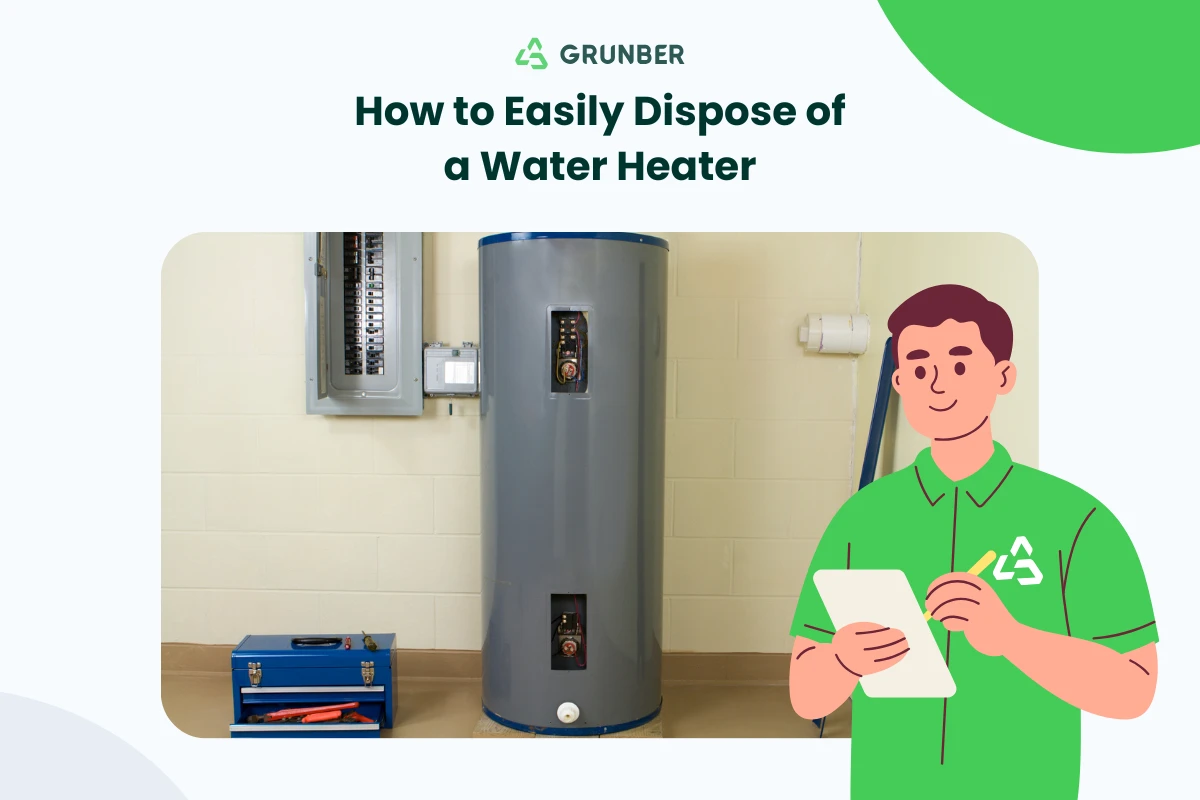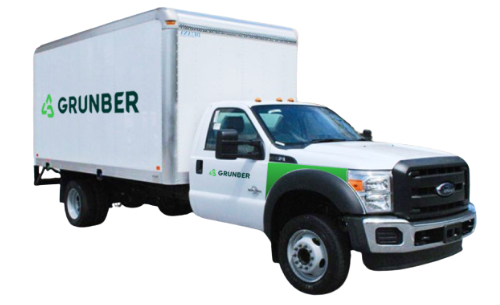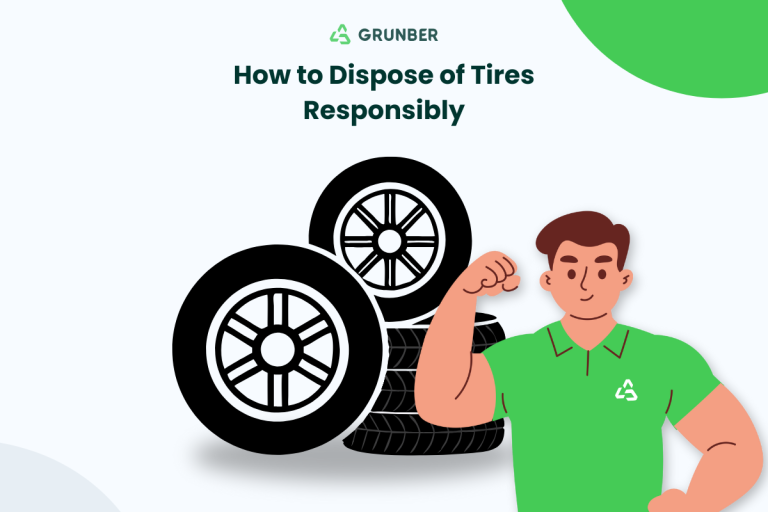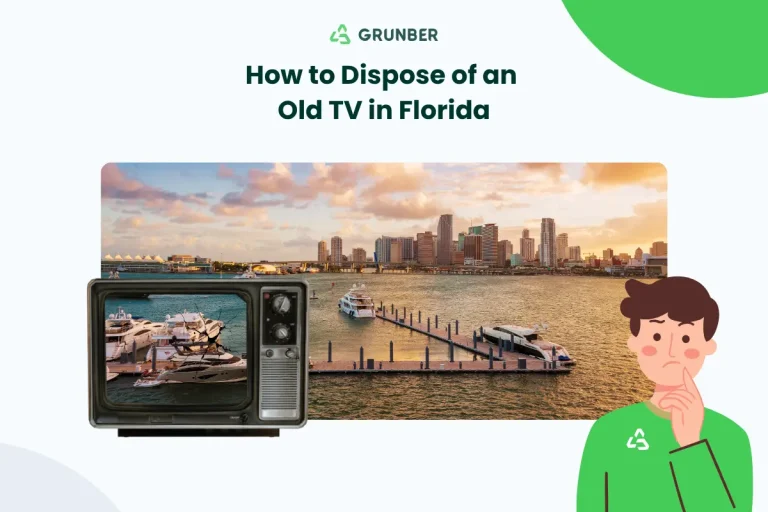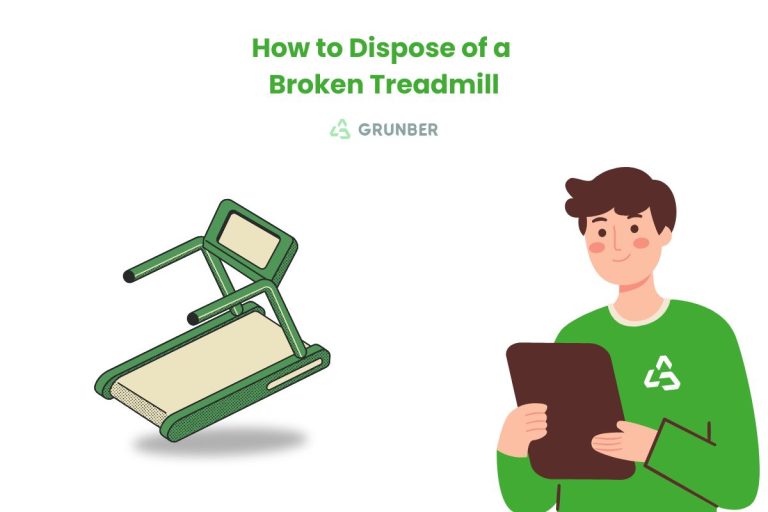Water heaters are common household appliances, essential for both commercial and residential purposes. These units typically last 10 to 15 years. However, as they age, they become less efficient and can even become unsafe, making timely replacement crucial.
When it’s time to replace or upgrade your old water heater, proper disposal is vital to prevent potential hazards and protect the environment. This process can be tricky, requiring careful consideration for safety and environmental protection.
Why Water Heaters Are Difficult to Dispose Of
Disposing of an old water heater isn’t as simple as tossing it in your regular trash or even a dumpster. Many U.S. landfills ban water heaters. This ban is due to several critical reasons:
- Hazardous Components: Water heaters may contain hazardous materials. For instance, pilot light sensors in gas water heaters can contain mercury, a chemical element with negative environmental consequences if released. They may also contain asbestos insulation, which is hazardous.
- Bulkiness and Landfill Space: These appliances are bulky and occupy significant space in landfills. Given that landfill space is limited in many communities, banning water heaters helps conserve valuable space.
- Hazardous Gases: The empty space inside an old water heater tank can accumulate hazardous gases, posing a risk of unsafe explosions or leaks into the air.
These factors highlight why specialized disposal methods are necessary to prevent contamination of air, ground, and water.
Parts of a Water Heater
Understanding the components of a water heater can be helpful when planning its disposal. Gas, oil, and electric water heaters share most common parts:
- Tank: The central component that holds hot water, typically lined with steel, insulated with polyurethane foam, and encased in an enamel metal jacket.
- Anode Rod: Suspended in the water inside the tank, usually made of aluminum or magnesium with a steel core, it helps minimize erosion.
- Heating Elements or a Burner: Electric water heaters use heating elements inside the tank, while gas water heaters use a burner under the tank and a chimney at the top.
- Thermostat: Located near the bottom, this device controls and monitors temperature.
- Temperature-Pressure Relief Valve: A crucial safety measure, this valve allows water to escape if tank pressure becomes too high, preventing explosions. It’s typically on the side, near the top.
- Water Discharge Pipe: Supplies hot water to your home, usually located at the top of the tank and extending into the water.
- Shut-off Valve: Located outside the unit, above it, this stops water flow into the tank.
- Drain Valve: Found at the bottom of the tank, used to empty the tank for sediment removal or when removing the unit from your home.
Knowing these parts can help identify which materials might be recyclable (e.g., copper, steel, aluminum, brass) or hazardous.
Responsible Disposal Methods
Before disposing of your old water heater, it’s recommended to hire a professional to remove it from your home and take out any hazardous components. Once removed, you can choose from several responsible methods:
1. Recycle It
Many recycling centers accept water heaters. These facilities separate components and recover valuable materials like copper, steel, aluminum, and brass for recycling, while properly disposing of hazardous elements.
- Check Terms: Always verify what materials your local recycling center accepts, if paperwork is required, and whether they offer pickup or require delivery. Some may charge a fee, while others recycle for free.
- Take-Back Programs: If you’re having a new water heater professionally installed, inquire about take-back programs offered by manufacturers or installers for your old unit.
- Community Collection Events: Some cities or counties host bulk trash collection events that might accept hot water tanks, though prohibitions are common, so always check first.
2. Donate It
If your old water heater is still functioning and usable, consider donating it. This option provides the unit with a second life and actively prevents it from ending up in a landfill, helping to minimize waste.
Benefits of Donation: Donating a working water heater provides further useful life to the unit and helps to prevent additional landfill waste. Arranging a pickup or drop-off with a charity may also allow you to receive a donation receipt for tax deductions.
Who to Contact for Donations:
- You can reach out to local charitable organizations such as Habitat for Humanity or homeless shelters, as they might need used water heaters.
- Contact your local government to inquire about other charitable organizations that may be in need.
- Some online platforms like Craigslist, Next Door, or Facebook Marketplace can also be used to offer your usable water heater for free, allowing someone to pick it up quickly and save you hassle.
- Charities like Vinnies and The Salvation Army often run programs to supply working hot water heaters to families in need.
Criteria for Donatable Water Heaters:
- Ideally, the unit should be less than 10 years old.
- It should have no visible damage, such as rust or leaks.
- It must have been recently serviced and meet safety standards.
- It should be a commonly used model that is easy to install.
- Electric and heat pump systems less than 5 years old are considered ideal donations due to their longer lifespans.
- If available, include all installation parts and manuals.
3. Scrap It
Scrapping involves selling parts or components of your water heater for cash.
- Value: The value depends on the weight of the scrap metal, but don’t expect a large sum; it’s typically not more than $25 for aluminum and steel parts.
- Locations: Local scrap yards often accept all types of metal and can provide an approximate value. You can also contact nearby repair shops that might be interested in purchasing water heater parts. Many plumbers report that “scrap guys love old heaters” and will pick them up quickly if left at the curb.
4. Hire a Professional Removal Service
This is often the most convenient option. Most removal services will pick up your water heater and dispose of it safely, adhering to local regulations. Companies like Grunber offer fast, eco-friendly junk removal services nationwide, focusing on recycling, repurposing, or donating items to reduce landfill impact.
5. Use a Landfill (Least Desirable Option)
While an option in some areas, taking your water heater to a landfill is generally the least desirable method.
- Prioritize Alternatives: Landfills waste valuable resources that could be reused or recycled. It’s best to explore other alternatives first.
- Check Rules: Always contact the landfill beforehand to determine their rules, regulations, and fees for appliance disposal.
Environmental Impact of Improper Disposal
Irresponsible disposal, such as simply throwing old hot water systems into general waste, carries significant environmental risks. Hazardous materials like heavy metals (e.g., mercury), insulation fibers, oils, and circuit boards can contaminate landfill sites.
- Contamination: Traces of water mixed with rust particles from tanks, along with household chemicals from e-waste components, can break down over years, allowing harmful substances to infiltrate water sources, leading to soil acidification, groundwater contamination, and bioaccumulation of toxins in plants and animals.
- Landfill Strain: Beyond contamination, landfills are rapidly filling up. The U.S. generates a disproportionate amount of the world’s garbage, and current estimates suggest landfill space could run out by 2036. Landfills produce landfill gas (90-98% methane and carbon dioxide), which is highly flammable and can cause breathing difficulties if it travels to nearby buildings.
- Broader Waste Issues: The problems extend beyond land to our oceans, which are overflowing with litter, and even space. Much of the ocean trash originates from land-based sources and can take hundreds of years to decompose, harming marine life.
Choosing responsible recycling or disposal methods is crucial for minimizing these negative impacts and preserving our planet’s resources.
Conclusion
No matter which option you choose for your old water heater, always remember to follow local guidelines and regulations. The key is to find the most suitable method that is safe and compliant with the rules for disposing of old appliances in your area. By opting for recycling, donation, scrapping, or professional removal, you contribute to a cleaner, more sustainable environment and reduce the strain on our planet’s resources.
If you have any inquiries or questions regarding the disposal of an old water heater, Cooper’s Water has an experienced team ready to help you, offering a wide range of plumbing products and services. For nationwide junk removal services that prioritize sustainability, Grunber are available to assist with fast, eco-friendly solutions
You may also be interested in:


